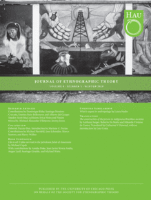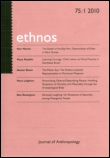
HAU-Journal of Ethnographic Theory
Scope & Guideline
Advancing Ethnographic Insights for a Deeper Understanding of Humanity.
Introduction
Aims and Scopes
- Interdisciplinary Ethnographic Research:
The journal publishes articles that draw on various disciplines, integrating methodologies from anthropology, sociology, cultural studies, and media studies to provide a rich, multidimensional perspective on human experiences. - Focus on Marginalized Voices:
HAU emphasizes the importance of representing marginalized and underrepresented communities, ensuring that their narratives and experiences are central to ethnographic inquiry. - Theoretical Innovation:
The journal encourages theoretical experimentation and the development of new frameworks that challenge traditional anthropological methods and concepts, promoting a deeper understanding of cultural phenomena. - Engagement with Contemporary Issues:
HAU addresses pressing global issues, such as migration, climate change, and social justice, using ethnographic methods to provide insights into how these issues affect individuals and communities. - Visual and Multimodal Ethnography:
The journal supports the use of visual and multimodal methodologies, recognizing the significance of diverse forms of representation in ethnographic research.
Trending and Emerging
- Psychological and Emotional Ethnography:
Recent publications demonstrate a growing interest in exploring psychological dimensions of cultural practices, emphasizing emotional experiences and their significance in ethnographic narratives. - More-than-Human Perspectives:
There is an increasing trend towards incorporating more-than-human perspectives, acknowledging the agency of non-human entities in ethnographic research, which aligns with contemporary ecological and environmental discussions. - Diaspora and Transnationalism:
The journal is witnessing a rise in studies focusing on diaspora communities and transnational connections, reflecting the complexities of identity and belonging in an increasingly globalized world. - Ethnography of the Digital:
Emerging themes include the impact of digital technologies on cultural practices and social interactions, highlighting the importance of understanding digital ethnography in contemporary research. - Critical Reflexivity and Ethics:
There is a trend towards greater emphasis on reflexivity and ethical considerations in ethnographic research, encouraging scholars to critically examine their positionality and the implications of their work.
Declining or Waning
- Traditional Cultural Practices:
There seems to be a decline in publications focusing solely on traditional cultural practices without addressing contemporary implications or changes. The journal's recent trend indicates a preference for discussions that link cultural heritage to current social dynamics. - Rigid Methodological Approaches:
The journal appears to be moving away from rigid, prescriptive methodological frameworks in favor of more flexible and adaptive approaches that incorporate reflexivity and the co-construction of knowledge. - Eurocentric Perspectives:
There is a noticeable decrease in articles that adopt Eurocentric viewpoints without critical engagement. The journal increasingly favors global perspectives that challenge Western hegemony in ethnographic scholarship. - Historical Ethnography:
While historical contexts remain important, the focus on purely historical ethnographic studies seems to be waning, with more emphasis placed on contemporary issues and their ethnographic implications.
Similar Journals

AMERICAN ETHNOLOGIST
Fostering Innovative Methodologies in EthnologyAMERICAN ETHNOLOGIST, published by Wiley, stands as a prominent platform in the field of anthropology, with a distinguished reputation underscored by its Q1 ranking in the 2023 Category Quartiles and a notable position in the 79th percentile among its peers. With its foundation dating back to 1974 and set to continue until 2024, this journal serves as a vital resource for researchers, practitioners, and students devoted to exploring cultural dynamics and social practices across diverse communities. The journal is characterized by its commitment to advancing theoretical discussions and empirical scholarship in ethnology and related disciplines. Targeted contributions include in-depth studies, critical reviews, and innovative methodologies that engage with pressing cultural issues. Although it does not offer Open Access, the journal’s rigorous peer-review process and high-impact articles ensure the dissemination of valuable insights, enhancing scholarly engagement and professional discourse. Its ISSN is 0094-0496 and E-ISSN is 1548-1425, emphasizing its dual format accessibility, which facilitates wider readership within the anthropology community.

Anthropology Today
Exploring the Depths of Human CulturesAnthropology Today, published by WILEY, is a leading peer-reviewed journal in the field of anthropology, boasting a distinguished Q1 category ranking in the 2023 evaluations and a notable position within the top 79th percentile of its discipline according to Scopus. Established in the United States, this journal offers a rich compendium of contemporary anthropological research, covering diverse topics that shape the understanding of human cultures and societies. It is recognized for its rigorous academic standards and commitment to publishing innovative studies that reflect current trends and discussions within the field. While the journal is not open access, it provides insightful articles and reviews that are indispensable for researchers, professionals, and students seeking to enhance their knowledge and stay updated with the latest anthropological findings and theoretical advancements.

Studia Ethnologica Croatica
Unlocking the Rich Tapestry of Ethnological ResearchStudia Ethnologica Croatica is a distinguished open-access journal dedicated to the fields of ethnology and cultural anthropology, published by the University of Zagreb's Faculty of Humanities and Social Sciences. Since its inception in 1989, the journal has provided a platform for scholarly discourse and critical analysis of cultural practices, social structures, and ethnographic research pertinent to Croatia and beyond. With an impressive Q2 ranking in Cultural Studies and a strengthening presence in Anthropology (Q3), the journal is essential for researchers and practitioners alike, contributing significantly to ongoing discussions within these disciplines. Recognized on Scopus with notable rankings, it represents a valuable resource for those seeking to deepen their understanding of contemporary ethnological issues. The journal operates under an open access model, ensuring that its high-quality research is freely accessible to a global audience, thereby fostering collaboration and inspiring new inquiries within the social sciences.

ANTHROPOS
Enriching academic discourse since 1983.ANTHROPOS is a distinguished journal published by NOMOS VERLAGSGESELLSCHAFT MBH & CO KG, anchoring its academic presence in Switzerland since its inception in 1983. With a commitment to advancing the fields of Anthropology and Arts and Humanities, this peer-reviewed publication serves as a vital platform for scholarly research, providing critical insights and fostering dialogue among researchers, professionals, and students alike. ANTHROPOS is categorized in Q3 for both Anthropology and the broader Arts and Humanities domains as of 2023, indicating its reputable yet emerging presence within these disciplines. Despite its significant contributions, the journal currently does not feature open access options, urging readers to engage through traditional academic channels. By embracing interdisciplinary approaches and contemporary issues, ANTHROPOS aims to illuminate complex cultural phenomena, making it an essential resource for anyone dedicated to understanding the intricacies of human societies.

Disparidades-Revista de Antropologia
Unlocking insights into the complexities of human society.Disparidades-Revista de Antropologia, published by CONSEJO SUPERIOR INVESTIGACIONES CIENTIFICAS-CSIC, has established itself as a vital platform for scholarly discourse within the fields of anthropology, cultural studies, and linguistics since its inception. With an Open Access policy introduced in 1996, this Spanish journal ensures that critical research is accessible to a global audience, fostering interdisciplinary dialogue and knowledge sharing. Residing in the culturally rich environment of Madrid, Spain, the journal's recent categorizations within the Q4 in Anthropology, Q3 in Cultural Studies, and Q3 in Linguistics and Language indicate its growing influence in these areas, even as its Scopus rankings reflect the ongoing challenges in enhancing its visibility and impact. Aimed at researchers, professionals, and students alike, Disparidades champions innovative approaches and diverse perspectives, making a significant contribution to the understanding of socio-cultural disparities in contemporary society. By providing an accessible forum for academic research, it plays a crucial role in advancing knowledge and scholarship across multiple disciplines.

Oido Pensante
Connecting Scholars and Sound in Meaningful WaysOido Pensante is a prominent open-access journal dedicated to the multifaceted field of music, published by the esteemed University of Buenos Aires, specifically through its Faculty of Philosophy and Letters, Institute of Anthropological Sciences. Since its inception in 2013, this journal has fostered a rich platform for scholarly discourse and innovative research at the intersection of music and cultural studies. With an ISSN of 2250-7116, Oido Pensante aims to bridge theoretical frameworks and practical applications, making significant contributions to the understanding of music in its social context. Currently, it holds an impressive Q3 ranking in the Arts and Humanities – Music category for 2023, with a Scopus rank of #99 out of 180 journals, reflecting its commitment to academic rigor and relevance. The journal's open access policy ensures that research is widely disseminated and accessible, making it an invaluable resource for researchers, professionals, and students alike in Argentina and beyond. With converged years from 2017 to 2024, Oido Pensante continues to expand its reach, encouraging intellectual exchange and stimulating dialogue within the music community.

Philippine Studies-Historical and Ethnographic Viewpoints
Exploring the Depths of Philippine NarrativesPhilippine Studies-Historical and Ethnographic Viewpoints, published by Ateneo de Manila University, serves as a premier platform for scholarly discourse in the realms of history, cultural studies, and social sciences. With an ISSN of 2244-1093 and an E-ISSN of 2244-1638, this journal is committed to advancing the understanding of the Philippine experience through rigorous ethnographic and historical methodologies. Achieving notable category quartiles, including Q2 in History and Q3 in Cultural Studies, the journal's impact is evidenced by its strong Scopus rankings—placing it in the 85th percentile for Arts and Humanities (History). This connectivity fosters a rich environment for researchers, professionals, and students eager to explore the nuanced narratives of the Philippines. Although the journal is not currently Open Access, it remains an essential resource for those dedicated to the exploration of the complex socio-political and cultural tapestry of the region. With a publication timeline extending from 2012 to 2024, it continues to shape academic inquiry with great relevance and authority.

ZEITSCHRIFT FUR ETHNOLOGIE - Journal of Social and Cultural Anthropology
Unveiling the Dynamics of Social StructuresZEITSCHRIFT FUR ETHNOLOGIE - Journal of Social and Cultural Anthropology, published by DIETRICH REIMER VERLAG, serves as a vital platform for the dissemination of high-quality research in the fields of social and cultural anthropology. Established with a commitment to advancing scholarly dialogue, this journal captures the dynamic interplay of cultural practices and social structures across diverse contexts. With an ISSN of 0044-2666, it gained significant traction among researchers, ranking in Q3 for Cultural Studies and Q4 for miscellaneous Social Sciences in 2023. Its Scopus ranking reflects its growing impact, particularly within the 68th percentile of Cultural Studies. Although the journal does not offer open access, it remains a crucial resource for academia, fostering critical insights and innovative analyses essential for students, professionals, and scholars alike. With a publication history highlighted by a convergence of issues from 1981 and various intervals, the journal is poised to shape debates in anthropological research both locally within Germany and globally.

Human Arenas
Advancing Insights Across Disciplines.Human Arenas, published by SPRINGER NATURE, is a distinguished academic journal that explores interdisciplinary insights at the intersection of the arts, humanities, social sciences, and psychology. Since its inception in 2018, the journal has quickly established itself, achieving notable rankings in 2023, including Q2 in Arts and Humanities (miscellaneous) and Q3 in Psychology (miscellaneous), reflecting its commitment to high-quality research and the promotion of innovative ideas. With an impressive Scopus ranking, particularly in Psychology where it holds the rank of #32 out of 97, Human Arenas serves as a platform for researchers, professionals, and students to disseminate their findings and engage with contemporary issues relevant to human behavior and societal dynamics. While Human Arenas offers traditional access options, it remains influential in nurturing scholarly discourse globally, especially in the Netherlands where it is proudly published. With its evolving scope set to encompass emerging topics until 2024, the journal stands as a vital contributor to the academic community, paving the way for future exploration and collaboration.

ETHNOS
A Premier Platform for Transformative ResearchETHNOS is a leading journal published by Routledge Journals, Taylor & Francis Ltd, dedicated to advancing the field of anthropology and archaeology. With an impressive impact factor reflected in its high Scopus rankings—#23 in Archaeology and #44 in Anthropology—the journal is recognized for its rigorous scholarship and its influence on contemporary discussions in social science. Operating since 1936, ETHNOS provides a vital platform for innovative research and theoretical discourse, making it an essential resource for professionals, academics, and students alike. Although it does not offer Open Access, its meticulous editorial standards and Q1 classification in both Anthropology and Archaeology guarantee substantive contributions to the study of culture and society. Located in the United Kingdom, the journal continues to shape the narratives surrounding social and cultural phenomena, enriching the academic landscape up to 2024 and beyond.